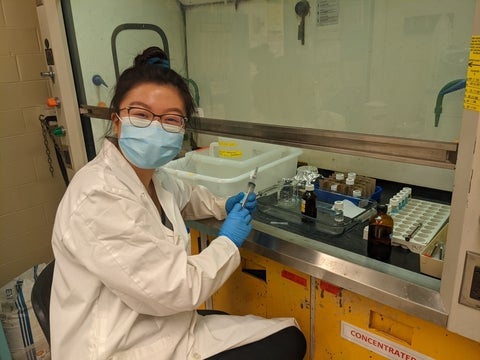Science that matters: Master’s student researches how contaminants biodegrade in nature and how much greenhouse gas they produce
By Alyana Versolatto
Graduate Recruitment Officer
Before beginning her graduate studies within the Faculty of Science, Jane Ye was an Environmental Sciences undergraduate student at Waterloo. Through her co-op work terms and her undergraduate thesis, Ye had the opportunity to be involved in research with different labs on campus. Through these experiences, she felt very supported by the community and was able to build strong relationships with her current lab group and supervisors, making her decision to continue as a master’s student an easy one.
Ye’s research interests lie in how contaminants and nutrients move around and interact in soils, sediments, surface water, and groundwater. Her master’s research project focuses on petroleum hydrocarbons (what oil and gas resources are made out of) and how they naturally biodegrade into carbon dioxide and methane in soils under different temperature and moisture conditions. “My work contributes to predicting how fast contaminants will biodegrade in nature, and how much greenhouse gas they may produce, which is important for planning the futures of contaminated sites,” explains Ye.
What has your experience been like studying in the Master of Science (MSc) in Earth Sciences program?
My experience as a graduate student has followed the typical ups and downs of research, but through it all I have had amazing opportunities and incredible support from my supervisors and lab group. I have been fortunate to present my work around the world at conferences, I have collected data using state-of-the-art methods and have expanded my professional and social network. I’ve met with many peers and experts on campus, as well as at other institutions, and in industry. In addition to the support from my supervisors, the support of other graduate students in my lab group has been crucial.

Speaking of supervisors, what is the working relationship like with yours?
I meet with at least one of my two supervisors every week or more/less frequently if required. At our meetings, I will often present my work progress, challenges, ideas, and plans, and my supervisors give their feedback. Sometimes, I am able to be more independent and look for feedback on my own ideas and plans. Other times, I need more guidance on things I'm unsure about and my supervisors provide more detailed advice.
I like this balance of our working relationship, as it allows me to practice making my own decisions and trying new things, but I also feel supported when I do need help. Beyond day-to-day guidance, I have also learned from my supervisors how to be a better scientist and communicator, how the world of academic research works, and what career options exist in academia and industry.
What's next for you?
After graduation, I will be starting a job at an environmental consulting company, working on a mix of contaminated site remediation as well as mine water remediation.

Jane Ye (she/her)
Master of Science (MSc) in Earth Sciences student